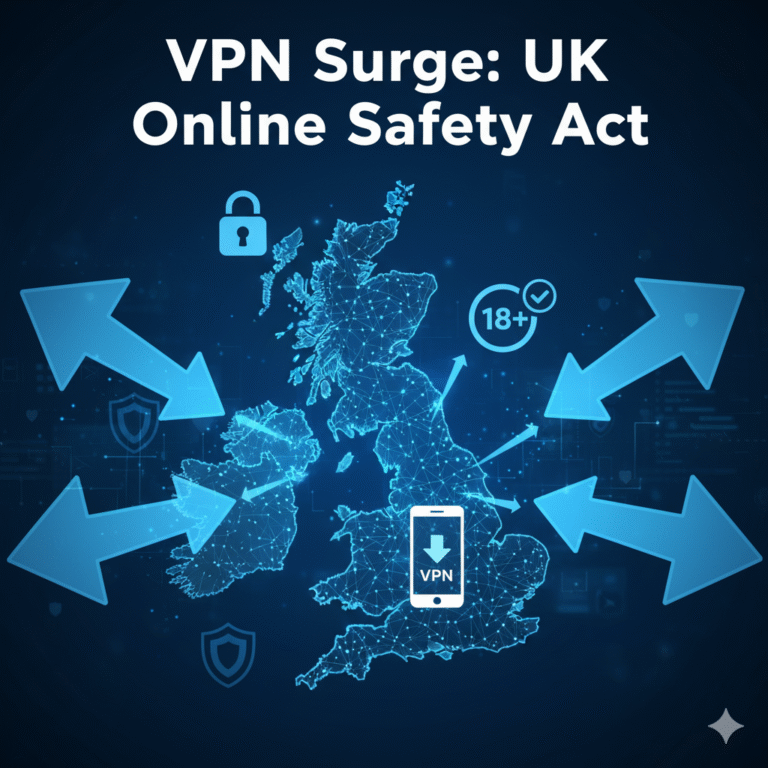In the first half of 2025 alone, the United Arab Emirates (UAE) recorded approximately 6.11 million downloads of mobile VPN apps, propelling the country to the forefront of global VPN adoption(VPN usage in UAE hits 6 million downloads in H1 2025). This remarkable number reflects more than a tech trend—it signals shifting user behaviours in the UAE around digital privacy, connectivity and regulatory balancing. For residents, expatriates and businesses alike, the surge in VPN usage spotlights how vital virtual private networks (VPNs) have become in the region’s online ecosystem.
Why the surge? Key drivers of VPN adoption in the UAE
Multiple factors explain why VPN usage in the UAE is climbing so rapidly.
1. High expatriate population & connectivity needs
With the UAE’s population reaching a record 11.44 million in 2025, and expatriates making up the vast majority of residents, maintaining connections with global contacts is a practical concern.
VPNs offer a reliable solution for secure, sometimes unrestricted access to apps, communication services and content from abroad.
2. Restrictions on VoIP and geo-services
One major component: limitations on voice-over-IP (VoIP) services like WhatsApp Calling, FaceTime and Skype in certain contexts in the UAE. Regional research confirms this factor is strongly correlated with higher VPN adoption in GCC countries.
Users turn to VPNs to bypass restrictions, access preferred platforms and maintain communication flows.
3. Privacy and security in a connected world
As remote work, cloud services and mobile usage continue to grow, so does concern about data privacy and unsecured networks. A VPN becomes a tool not just for content unblocking, but for encryption and safer browsing.
In the UAE context this means residents using public WiFi, moving between workspaces or travelling may lean on VPNs to protect sensitive traffic.
What the numbers show & how the UAE compares
Downloads: 6.11 million VPN app installs in January–June 2025, compared with 9.2 million in full year 2024 and 7.81 million in 2023.
Adoption rate: Over a five-and-a-half year span (2020 to H1 2025), the UAE’s VPN adoption rate was measured at 65.78%—the highest globally.
Regional comparison: Following the UAE are Qatar (55.43%), Singapore (38.23%) and Oman (31%). GCC countries dominate.
These figures place the UAE far ahead of many Western nations, where VPN adoption often remains below 20%. The regional digital context (large expat communities, mobile-first internet use, communications needs) helps explain the gap.
Legality and regulatory context
Using a VPN in the UAE is not illegal per se, but there are important caveats.
Under Federal Decree‑Law 34 of 2021, using a VPN to commit a crime, conceal one’s IP while accessing blocked services or circumventing regulations can incur fines from AED 500,000 to AED 2 million and potentially imprisonment.
For businesses, use of a VPN for legitimate remote access remains lawful (and even encouraged). The risk is personal misuse or bypassing content governed by UAE law.
What the trend means for users, businesses & providers
For everyday users:
Many residents may assume VPN use is solely for entertainment or bypassing. But the large install numbers suggest a mix of use-cases: communication, security, remote work and privacy.
The high adoption rate also means more competition in VPN services targeted at the UAE market—providers may optimize for local speed, servers and unblocking capabilities.
For businesses and enterprises:
Employees in the UAE or expatriates working remotely may rely on VPNs for secure access—indicating the importance companies place on encrypted channels.
Regulators and network administrators must remain vigilant about compliance, ensuring VPN use aligns with corporate policies and legal frameworks.
For VPN service providers:
The UAE is now a major growth market. Providers may increase server deployments, localization, Arabic language support and partnerships.
The regulatory overlay means providers must be clear about legality and responsible use to avoid risk of reputational damage.
Learn more than Surfshark drops legacy-iOS/macOS support to boost VPN security
Expert perspective
Cybersecurity analysts emphasise that high VPN adoption in regions like the UAE is less about illicit activity and more about practical connectivity in regulated digital environments. As one researcher noted: “VPN use surges where internet restrictions meet mobile-first populations and high expat density”.
Another expert pointed out that “an adoption rate above 60% signals that using a VPN has become almost routine for thousands of residents”—not just a niche privacy tool.
Conclusion
The UAE’s milestone of over 6 million VPN downloads in just the first half of 2025 signals a major shift in how residents engage with digital networks, privacy and connectivity. While high adoption brings benefits—secure access, privacy tools and global communication—it also brings responsibility: understanding local laws, selecting trustworthy services and using VPNs within legal frameworks. For anyone operating in or with the UAE, the message is clear: VPNs are now mainstream, and the dynamics around them are evolving fast.



